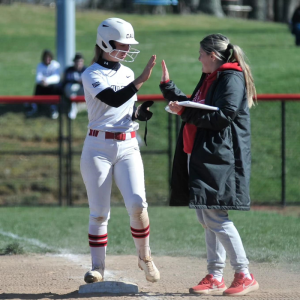Music and Stress
There’s sound science behind students using music to decompress
Scott Celani, a musician from Buffalo, New York, previously performed outside the Natali Student Center during a Mental Health Awareness Day, March 30, 2021
November 4, 2022
With eight in ten college students experiencing frequent periods of stress and anxiety, many are finding relief by listening to music.
College students can use music in many ways, such as background noise, as a learning aid, as a stress reducer, as motivation and inspiration, as concentration and focus, for calming fear and worry, and for cognitive associations.
Kaitlyn Pletcher, an early childhood education/special education major from Indiana University of Pennsylvania said music helps her relieve stress when she feels overwhelmed or piled up with work, whether that be for school or just things to do.
“Typically, I tend to listen to country or pop music in these situations, allowing me to feel calm and peaceful emotions,” Pletcher said.
According to the counseling services at the University of Nevada, Reno, music is an effective way to relax and manage stress, as current findings conclude that music around 60 bpm can cause the brain to synchronize with the beat causing alpha brainwaves. Alpha brainwaves, which are frequencies from eight to 14 hertz, or cycles per second, are present when one feels relaxed and conscious.
Frank Stetar, assistant professor of music, and the director of University Bands at PennWest California University said music can be beneficial at certain times if the proper music is chosen.
“The key of the music and instrumentation is the main component to this,” Stetar said. “Major keys are meant to be happy, minor keys are meant to be sad. Fast is geared to energy and happiness while slow is geared to sad and somber.”
On top of the traditional stress that college students feel, the COVID-19 pandemic increased the number of things students had to balance. For example, after being isolated from the world for nearly two years, social anxiety in college students has amplified.
According to a study by the Penn State Center for Collegiate Mental Health, between the Fall of 2020 and 2021, social anxiety significantly increased alongside academic distress.
Rebekah Phillippi, a human biology major from Chatham University said her social anxiety has increased post-pandemic, because we had to isolate ourselves to stay safe and reduce the risk of getting COVID.
“Although things are starting to open up completely, I feel there is a lot of anxiety around if things will ever go back to the way they were before the pandemic,” Phillippi said.
Jill Suttie, a doctor of psychology, found that researchers have discovered that “musical reactivity is casually related to… basic social motivations” and that “reactivity to music is related to markers of successful group living.”
Music, as it has many genres, can benefit people when preparing for different situations.
“People listen to different types of music for different reasons,” Stetar said. “If you are under a lot of stress and want to relax, easy listening music which is more instrumental with strings is usually a good fit.”
Some students have even related specific events and emotions to different types of music or a particular song.
Sydney Sullivan, a Business Administration major at PennWest, said she finds peace in Christian music.
“When I’m stressed out by different things in life, I put on my favorite songs that remind me of the grace I received from Christ and a lot of my worries fade away at that point,” Sullivan said.






